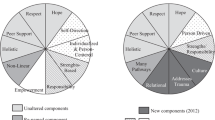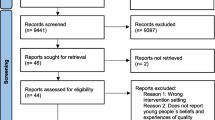Abstract
Individuals with severe mental illness are at particularly high risk of adverse outcomes such as rehospitalization, homelessness, or harm to self or others, when they are not connected to hospital resources after discharge. In order to drastically reduce the risk of such adverse outcomes, continued emotional and practical support is crucial during the transition from hospital to community. Current collaborative care models do not provide consistent care to address these issues. This paper discusses a collaborative care model involving a tertiary mental health hospital and a community mental health service agency within Durham Region of Ontario, Canada. The CREATE program supports individuals from hospitalization to greater independence, by leveraging empirically supported treatment targets and a client-centered approach. A prospective cohort study was conducted, analyzing program components to determine the impact of CREATE on client outcomes. Clients were assessed on the following parameters: rehospitalizations, level of care, perceived need, and life skills. Results revealed that clients reported greater confidence in various life skills at the end of the program relative to the program's outset. Half of the clients who completed the program achieved independent housing with case management support, while others moved to a more suitable level of care such as a group home, home for special care, or rehospitalization. While more work needs to be done to identify the nuances of what makes the program successful, the promising results from this evaluation can help encourage other communities/agencies to implement similar models of care.
Similar content being viewed by others
References
Altamura, A. C., Bobes, J., Cunningham, O. D., Gerlach, J., Hellewell, J., Kasper, S., Naber, D., Tarrier, N., & van Os, J. (2000). Schizophrenia: Diagnosis and continuing treatment. International Journal of Psychiatry in Clinical Practice, 4(1), S1-S11.
Baker, E., Gwernan-Jones, R., Britten, N., Cox, M., McCabe, C., Retzer, A., Gill, L., Plappert, H., Reilly, S., & Pinfold, V. (2019). Refining a model of collaborative care for people with a diagnosis of bipolar, schizophrenia or other psychoses in England: A qualitative formative evaluation. BMC Psychiatry, 19(1), 1-17.
Dennis, M. L., Feeney, T., Stevens, L. H., & Bedoya, L. (2008). Global Appraisal of Individual Needs–Short Screener (GAIN-SS): Administration and scoring manual for the GAIN-SS version 2.0.1. 2006. Normal, IL: Chestnut Health Systems. http://www.chestnut.org/LI/gain/GAIN_SS/index.html.
Dixon, L., Goldberg, R., Iannone, V., Lucksted, A., Brown, C., Kreyenbuhl, J., Fang, L., & Potts, W. (2009). Use of a critical time intervention to promote continuity of care after psychiatric inpatient hospitalization. Psychiatric Services, 60(4), 451-458.
Dolder, C. R., Lacro, J. P., Dunn, L. B., & Jeste, D. V. (2002). Antipsychotic medication adherence: Is there a difference between typical and atypical agents? American Journal of Psychiatry, 159(1), 103-108.
Granholm, E., Holden, J. L., Sommerfeld, D., Rufener, C., Perivoliotis, D., Mueser, K., & Aarons, G. A. (2015). Enhancing assertive community treatment with cognitive behavioral social skills training for schizophrenia: Study protocol for a randomized controlled trial. Trials, 16(1), 1-13.
Herceg, M., Jukić, V., Vidović, D., Erdeljić, V., Ćelić, I., Kozumplik, O., Bagarić, D., & Silobrčić Radić, M. (2008). Two-year rehospitalization rates of patients with newly diagnosed or chronic schizophrenia on atypical or typical antipsychotic drugs: Retrospective cohort study. Croatian Medical Journal, 49(2), 215-223.
Hudson, C. G. (2019). Five-year rehospitalization experience of a state-wide cohort of persons with schizophrenia. Social Psychiatry and Psychiatric Epidemiology, 54(7), 861-870.
Jin, H., Meyer, J. M., & Jeste, D. V. (2004). Atypical antipsychotics and glucose dysregulation: A systematic review. Schizophrenia research, 71(2-3), 195-212.
Leucht, S., & Lasser, R. (2006). The concepts of remission and recovery in schizophrenia. Pharmacopsychiatry, 39(05), 161-170.
Nasrallah, H. A., Meyer, J. M., Goff, D. C., McEvoy, J. P., Davis, S. M., Stroup, T. S., & Lieberman, J. A. (2006). Low rates of treatment for hypertension, dyslipidemia and diabetes in schizophrenia: Data from the CATIE schizophrenia trial sample at baseline. Schizophrenia research, 86(1-3), 15-22.
Olfson, M., Mechanic, D., Boyer, C. A., & Hansell, S. (1998). Linking inpatients with schizophrenia to outpatient care. Psychiatric Services, 49(7), 911-917.
Schmidt-Kraepelin, C., Janssen, B., & Gaebel, W. (2009). Prevention of rehospitalization in schizophrenia: Results of an integrated care project in Germany. European Archives of Psychiatry and Clinical Neuroscience, 259(2), 205-212.
Slade, M., & Thornicroft, G. (2020). Camberwell assessment of need. Cambridge University Press.
Sowers, W., George, C., & Thompson, K. (1999). Level of care utilization system for psychiatric and addiction services (LOCUS): A preliminary assessment of reliability and validity. Community Mental Health Journal, 35(6), 545-563.
Sowers, W., Pumariega, A., Huffine, C., & Fallon, T. (2003). Best Practices: Level-of-care decision making in behavioral health services: The LOCUS and the CALOCUS. Psychiatric Services, 54(11), 1461-1463.
Tyler, N., Wright, N., & Waring, J. (2019). Interventions to improve discharge from acute adult mental health inpatient care to the community: Systematic review and narrative synthesis. BMC Health Services Research, 19(1), 1-24.
Wray, A. M., Hoyt, T., Welch, S., Civetti, S., Anthony, N., Ballester, E., & Tandon, R. (2019). Veterans engaged in treatment, skills, and transitions for enhancing psychiatric safety (VETSTEPS). Psychiatric Rehabilitation Journal, 42(3), 277.
Funding
The authors declare that no funds, grants, or other support were received during the preparation of this manuscript.
Author information
Authors and Affiliations
Corresponding author
Ethics declarations
Conflict of interest
The authors have no relevant financial or non-financial interest to disclose.
Ethical Approval
This study was conducted as a quality improvement project for the CREATE program, thus institutional Research Ethics Board approval was waived.
Additional information
Publisher's Note
Springer Nature remains neutral with regard to jurisdictional claims in published maps and institutional affiliations.
Rights and permissions
About this article
Cite this article
O’Connell, J., Magurno, A., Wagner, F. et al. Preparing for Independent Living Following Psychiatric Hospitalization. J. Psychosoc. Rehabil. Ment. Health (2023). https://doi.org/10.1007/s40737-023-00351-6
Received:
Accepted:
Published:
DOI: https://doi.org/10.1007/s40737-023-00351-6




